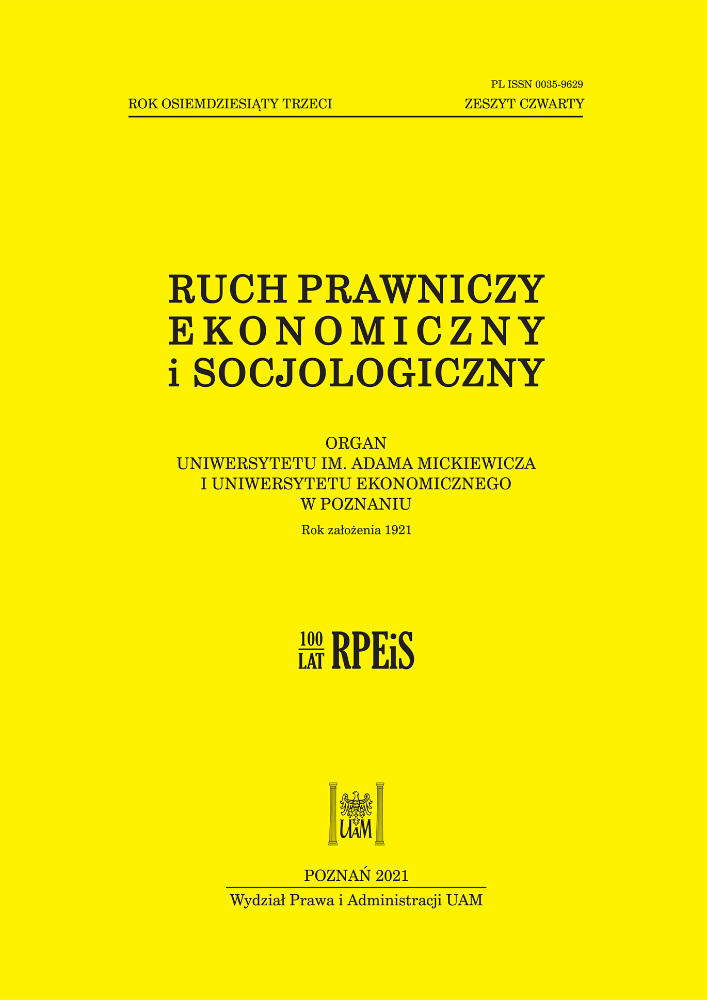Abstrakt
Value relevance to koncepcja, wedle której wartości księgowe oddziałują na rynkową wycenę spółki, kurs akcji czy ich stopy zwrotu w kolejnych okresach. Większość badań przeprowadzanych w tym zakresie opiera się na danych panelowych, syntetycznie ujmując tendencje obserwowalne dla grupy spółek. W przypadku analiz przeprowadzonych na przykładzie polskiego rynku kapitałowego wyróżnić można kilka odnoszących się do empirycznego wpływu zysków i danych bilansowych na zmienne rynkowe, a także do wpływu wprowadzenia nowych regulacji w zakresie rachunkowości na stopień value relevance. Badania zazwyczaj pomijają przedsiębiorstwa z sektora finansowego, jednakże wyróżnić można także takie, które skupiają się na określonej grupie podmiotów, takich jak banki czy zakłady ubezpieczeń. W artykule pod uwagę wzięto właśnie ostatnią z wymienionych grup. Niemniej zaprezentowano w nim odmienne podejście niż w większości badań empirycznych – skupiono się na danych finansowych jednej spółki z sektora ubezpieczeń: PZU S.A. Analizę przeprowadzono z wykorzystaniem modeli regresji liniowej, stosując modele oparte na MNK i metodę Praisa-Winstena. Wykorzystano dane finansowe pochodzące z raportów kwartalnych, półrocznych i rocznych z lat 2009–2019. Wyniki badania wskazują na objaśnianie kursów akcji w przyszłości szczególnie przez dane bilansowe, przede wszystkim aktywa i rezerwy techniczno-ubezpieczeniowe, a także przez operacyjne przepływy pieniężne, wynik techniczny i składkę na udziale własnym. Przedstawiono kilka modeli, które można uznać za użyteczne, biorąc pod uwagę ich poprawność pod względem statystycznym i zgodność oszacowań parametrów z założeniami teoretycznymi. Rezultat ten wskazuje również na celowość badań w koncepcji value relevance w odniesieniu do indywidualnych podmiotów.
Bibliografia
Al-Debie, M., Walker, M. (1999). Fundamental information analysis: an extension and UK evidence. British Accounting Review 31: 261−280.
Alexakis, Ch., Patra, T., Poshakwale, S. (2010). Predictability of stock returns using financial statement information: evidence on semi-strong efficiency on emerging Greek stock market. Applied Financial Economics 20(16): 1321−1326.
Alnodel, A. (2018). The impact of IFRS adoption on the value relevance of accounting information: evidence from the insurance sector. International Journal of Business and Management 13(4): 138−148.
Barth, M.E., Li, K., McClure, Ch.G. (2019). Evolution in value relevance of accounting information. Stanford University Graduate School of Business Research Paper No. 17−24.
Beisland, L.A. (2009). A review of the value relevance literature. The Open Business Journal 2: 7−27.
Bolibok, P.M. (2018). The impact of the market cycle on the value relevance of book values and earnings in the banking industry: an evidence from Poland. Finansy: teoriya i praktika 22(2): 6−25.
Chalmers, K., Clinch, G., Godfrey, J. (2011). Changes in value relevance of financial information upon IFRS adoption: evidence from Australia. Australian Journal of Management 36(2): 151−173.
Chan, L.K.C., Hamao, Y., Lakonishok, J. (1990). Fundamentals and Stock Returns in Japan. Working Paper No. 45. Graduate School of Business. Columbia University.
Chou, P.-H., Chou, R.K., Wang, J.-S. (2004). On the cross-section of expected stock returns: Fama-French ten years later. Finance Letters 2(1): 18−22.
Collins, D.W., Maydew, E.L., Weiss, I.S. (1997). Changes in the value-relevance of earnings and book values over the past forty years. Journal of Accounting and Economics 24(1997): 39−67.
Davies, S.D., Macfubara Minafuro, S. (2018). Financial risk and value relevance of accounting information: evidence from Nigeria quoted insurance firms. Journal of Accounting and Financial Management 4(3): 45−63.
Dobija, D., Klimczak, K.M. (2010). Development of Accounting in Poland: Market efficiency and the value relevance of reported earnings, The International Journal of Accounting 45(3): 356–374.
Ebaid, I.E.-S. (2011). The value relevance of accounting-based performance measures in emerging economies: the case of Egypt. Management Research Review 35(1): 69−88.
Fama, E.F., French, K.R. (1992). The cross-section of expected stock returns. The Journal of Finance 47(2): 427−465.
Fraś, A. (2017). Nowe strategie inwestowania pasywnego – inteligentna beta. Studia Ekonomiczne. Zeszyty Naukowe Uniwersytetu Ekonomicznego w Katowicach 325: 58−69.
Giosi, A., Testarmata, S., Buscema, I. (2013). The value relevance of financial information in troubled waters: the evidence of Italian context, International Conference “Financial Distess: Corporate Governance and Financial Reporting Issues”, Rome, 17−18.10.2013: 62−27.
Gruszczyński, M., Bilicz, R., Kubik-Kwiatkowska, M., Pernach, A. (2016). Value relevance of companies’ financial statements in Poland. Quantitative Methods in Economics 17(4): 40−49.
Holthausen, R.W., Watts, R.L. (2001). The relevance of the value-relevance literature for financial accounting standard setting. Journal of Accounting and Economics 31: 3−75.
Keener, M.H. (2011). The relative value relevance of earnings and book value across industries. Journal of Finance and Accountancy 6(May). .
Khanagha, J.B. (2011). Value relevance of accounting information in the United Arab Emirates. International Journal of Economics and Financial Issues 1(2): 33−45.
Khanna, M. (2014). Value relevance of accounting information: an empirical study of selected Indian firms. International Journal of Scientific and Research Publication 4(10): 364−369.
Kouki, A. (2018). IFRS and value relevance: a comparison approach before and after IFRS conversion in the European countries. Journal of Applied Accounting Research 19(1): 60−80.
Landsman, W.R., Maydew, E.L., Thornock, J.R. (2011). The information content of annual earnings announcements and mandatory adoption of IFRS. Journal of Accounting and Economics 53(1): 34−54.
Lev, B., Thiagarajan, S.R. (1993). Fundamental information analysis. Journal of Accounting Research 31(2): 190−215.
Mulenga, M.J. (2015). Value relevance of accounting information of listed public sector 25 banks in Bombay Stock Exchange. Research Journal of Finance and Accounting 6(8): 222–231.
Ohlson, J. (1995). Earnings, book values and dividends in equity valuation. Contemporary Accounting Research 11(2): 661−687.
Park, C. (2015). The stock price of relevance of accounting information according to business cycle and industries. Scientific Cooperations International Journal of Finance, Business, Economics, Marketing and Information System 1(1): 41–50.
Sarifudeen, A.L. (2016). The impact of accounting information on share prices: a study of listed companies in Sri Lanka. Journal of Accountancy and Finance 3(1): 47–59.
Uwuigbe, O.R., Uwuigbe, U., Jafaru, J., Igbinoba, E.E., Oladipo, O.A. (2016). Value relevance of financial statements and share price: a study of listed banks in Nigeria. Banks and Bank System 11(4/1): 135–143.
Witkowska, M. (2006). Fundamentals and stock returns on the Warsaw Stock Exchange: the application of panel data models. Department of Applied Econometrics Working Paper No. 4-06. Warsaw School of Economics.
Licencja
Prawa autorskie (c) 2021 WPiA UAM

Utwór dostępny jest na licencji Creative Commons Uznanie autorstwa – Użycie niekomercyjne – Bez utworów zależnych 4.0 Międzynarodowe.





